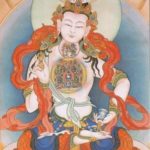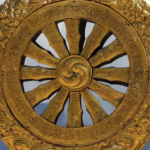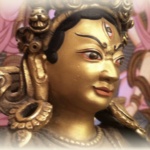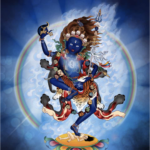Patience Chapter
of the Guide to the Bodhisattva’s Way of Life
Translated by Geshe Sonam
1.
Accumulated over a period of thousands of eons,
Generosity, offerings to sugatas and so forth,
Whatever I have properly engaged in too,
Would be destroyed by a single (moment) of anger.
2.
There is no sin like hatred
And no grit like patience.
Therefore, by various means,
Consistently habituate with patience.
3.
By keeping the painful thought of anger,
The mind will never experience peace;
Delight and pleasure won’t be found either.
With no sleep, there will be no stability.
4.
For the generosity of wealth and respect,
Those who are dependent on the compassionate one,
When possessed by anger,
Even they revolt to kill that master.
5.
This will sadden the beloved near ones;
Even if drawn by generosity, they will not bond.
In short, there is no one at all
Who lives happily with anger.
The enemy that is anger creates this
And other kinds of sufferings.
He who destroys anger with assiduousness
Will be happy in this and others.
7.
From doing the unwanted
And by preventing the desired
When the food of mental unhappiness is found,
It will invigorate anger and destroy me.
8.
Therefore, I will completely destroy
The (the poisonous) food of my enemy,
Since other than harming me
This enemy has no other task.
9.
At all cost, I shall not
Disturb the mind of joy.
Wishes will not be fulfilled by being unhappy;
Virtues will come to decline.
10.
If it can be remedied,
What is there to be unhappy about it?
If it cannot be remedied,
What benefit is there in being unhappy about it?
11.
Sufferings, contempt, harsh words and infamy—
I wish none of these
For myself or for my friends:
For the enemies, it is the opposite.
12.
The causes of joy seldom occur;
The causes of sufferings are extremely abundant.
There is no renunciation without suffering.
Therefore, ‘Mind’, “you should be resolute”.
13.
The devotees of the Disrupter of Asceticism[1] and Karnata[2]
Could bear the burns and cuts for no purpose:
Then, for the sake of nirvana
Why would I tremble with fear?
14.
There is nothing that does not become easy
Upon cultivating familiarity;
Therefore, by habituating with small harms,
Strive to bear greater harms.
15.
The snakes and insects that bite,
The feelings from hunger, thirst and so forth,
As well skin infections and so forth,
The sufferings with no purpose,
Can you not see them?[3]
16.
Heat, cold, rain, wind and so forth,
Sickness, captivity, assault and so forth—
I should not be impatient with them
For doing thus would (only) increase the affliction.
17.
Some people’s bravery and determination will greatly increase
If they come to see their own blood;
There are some who would faint
As they come to see other’s blood.
This has happened due to a stable
And a frightened state of mind.
18.
Therefore, by ignoring all harms,
Do not be faltered by the sufferings.
Even when sufferings befall them
The wise should defile the immaculate clarity of mind.
19.
As one battle against the delusions,
Much tribulation is there when battling.
Those triumphants are heroes
Who overlook every suffering and defeat enemies like anger:
The rest (merely) kill corpses.
20.
Furthermore, the goodness of suffering
Is that by being saddened, conceit is dispelled;
Compassion grows for those in samsara;
One refrains from sins and delight in virtues.
21.
Without getting angry at jaundice and so forth
Which are greater sources of sufferings,
Why would I get angry at those with consciousness?
All of these have only been provoked by conditions.
22.
Without desiring it,
Just as this illness has come into being,
Likewise, even when not desiring them
Delusions come into being forcefully.
23.
Without any intention to get angry
People just get angry.
Without any intention to arise,
Like anger, they [delusions] arise.
24.
Whatever faults there are
As well as sins of different facets—
All have resulted from the power of conditions:
There is none that is independent.
25.
All conditions gathered together
Do not have the intention to produce;
All those that are produced
Do not have the thought that I was produced.
26.
The generic essence that is accepted,
And the ‘self’ that is postulated,
Thinking that I would come into being,
None of them came into being intentionally.
27.
Since it [the generic essence] can’t exist without arising,
How then, could anything be asserted as arising (from it)?
As it[4] will always be preoccupied with its object,
There would be no cessation as well.
28.
If the self is permanent,
Like space, it would obviously be without function.
Even when met with other conditions,
What could be done if it cannot be altered?
29.
If it is same as before when acted upon (by conditions),
What could actions have done to it?
To determine that this is the action of that,
What kind of relation is there?
30.
Thus, everything is depended on others.
Due to this, there is no independence.
Having known that, do not be angry
With all things that are like magical display.
31.
“When asked, which is dispelled by what
And that dispelling is also not plausible,”
Then I assert that by relying on this,
Miseries will cease to continue,
And there is nothing implausible about it.
32.
Therefore, be it a foe or a beloved one,
If you see them doing the improper,
Then by thinking that these arose from such conditions,
Be at ease.
33.
If things come into existence naturally[5],
As nobody wishes for sufferings,
Then sufferings would not have befallen
On any of these embodied beings.
34.
Being not conscientious, on oneself too,
One would bring the harms of thorns and so forth.
To obtain women and the likes, becoming obsessed
They would do things like depriving themselves of food.
35.
Some hang themselves or jump off cliffs,
Eat poison or unhealthy food,
(And) by means of negative actions,
Bring harm upon themselves.
36.
While being influenced by delusions
If even the beloved self is killed,
Then at that time, why would they
Not inflict harm on other’s body?
37.
From the birth of delusions,
They engage in killing themselves and the likes;
If compassion for them does not arise at all,
What kind of resolve is it to get enraged at?
38.
If inflicting harms on others
Is in the nature of childish beings,
Like begrudging fire for its blazing nature,
It is untenable to be angry at them.
39.
And if the faults are arbitrary
While sentient beings by nature are gentle,
Even then it is improper to be angry,
Just as begrudging the sky for the rising smoke in it.
40.
Although sticks and the likes are employed,
If one is angry at the wielder,
As he too is propelled by hatred,
If at all[6] it is proper to be angry at hatred.
41.
In the past, I have caused
These sorts of harms on sentient beings.
Therefore, as I have inflicted pains on them,
It is befitting that these harms befall me.
42.
His weapon and my body,
Both are causes for miseries:
Since he drew out weapon and I the body,
Which of them should I be angry at?
43.
This boil that looks like a human form,
Intolerant to touch and miserable by sufferings,
Lured and blinded, as I hold on to it,
To whom should I be angry at for harming it?
44.
Since the childish do not wish to suffer
And (yet) craves for the causes of sufferings,
For harms inflicted by one’s own faults,
What is there to hold grudge against others?
45.
Just like the guards in the hell
And the forest of razor-sharp leaves (Of hell),
As these are born from my own actions [karma],
To what should I be angry?
46.
Conspired by my own karma,
Offenders who inflict harm on me came into being;
Since this[7] would lead sentient beings into hell,
Haven’t I not ruined them?
47.
In depending upon them through patience
I could purify many of my sins.
In depending upon me, for long
They will wander in the miserable hells.
48.
I am the cause of harms for them
While they cause me benefits,
Then in a perverted manner,
‘Unruly Mind’, why do you get angry?
49.
If I have the quality of thought,
I will not go to hell.
If I protect myself (by practising patience)
From this, what would come to them[8]?
50.
If I respond back with harm,
They[9] would not be protected
While my deeds would also be ruined:
Thus, my grit would collapse.
51.
As mind is not a physical object,
No one can destroy it in any way.
By strongly grasping at this body,
It is inflicted with harms by sufferings.
52.
Utterance of insults, abusive words
And those that are not pleasant,
As these do not inflict the body with harm,
‘Mind’, why do you get enraged?
53.
Other’s displeasure with me,
In this life or in other lifetimes
As it does not devour me,
Why do I dislike it?
54.
If it is because they pose obstruction to gains
That I do not want them, (then)
I would lose these gains
And (yet) the sins will remain intact.
56.
It would be better for me to die now:
Living long with false livelihood would be improper.
Even if I were to live long
The suffering of death is just the same.
57.
One who experienced happiness for hundred years in a dream
And then woke up from it,
And another who experienced a moment’s pleasure
And came out from it,
Although both of them have come out from it,
Their happiness will not return again.
For both long and short lives,
At the time of death, it is just the same.
58.
Having amassed much gains
Even if you indulged in pleasures for long,
Like being robbed by thieves,
Nakedly, you will go empty handed.
59.
“If gains could sustain me to live (long),
(Then) I could purify sins and accrue merits;”
(Well then) for the sake of gains if you get angry,
Wouldn’t that degrade your merits, and be sinful?
60.
The purpose for which I am alive,
If that is going to degenerate,
Then by committing only sins,
What is there in being alive?
61.
“If because this weaken (the confidence of) sentient beings (in me),
I should be angry at those speaking unpleasant things,”
Likewise, at those too, who speak unpleasant things about others,
Why are you not angry?
61.
“Since disdain depends on others
And you can bear it when (in others) there is no faith (for another),”
As they [unpleasant words] depend on the birth of delusions,
Why can’t you bear it when unpleasant things are spoken of?
62.
Even when the images, stupas and the sublime Dharma
Are spoken of disparagingly and destroyed,
As the buddhas and the likes cannot be harmed,
It would be improper to get angry.
63.
Even with those who cause harm
Towards spiritual guides, relatives, friends and the likes,
Just like before, by seeing that
These came to be caused by conditions, abandon anger.
64.
If both sentient and non-sentient things
Have caused harm on embodied-beings,
Why single out the sentient and hold resentment?
Therefore, be able to tolerate the harm.
65.
Some commit offences out of ignorance;
Others get offended due to ignorance.
What would determine them as faultless?
Which of them would be at fault?
66.
That which caused harm on others
Why did you do that action in the past?
If everything depends on karma,
Why should I hold grudge against this?
67.
Having seen thus, by all means
I shall strive in the merits with diligence,
So that all of them (sentient beings)
Would become kind to one another.
68.
When the fire of a burning a house
Advances towards other houses,
Just as it is appropriate to remove and throw away
Anything that is ablaze, such as straws and so forth,
69.
Likewise, by being attached to something,
As the fire of hatred flares up,
For fear of destroying merits,
Throw it away instantly.
70.
For someone to be executed, if his life were to be spared
By chopping off his hands, wouldn’t that be great?
If human miseries would bring liberation from hell,
Wouldn’t it be great?
71.
If I could not tolerate
Even the sufferings of the present such as these,
Why shouldn’t I eliminate anger,
The cause of the sufferings of hells?
72.
For the sake of desire, burning and the likes in hells,
Although I have experienced them for thousands (of aeons),
I have neither accomplished my own purposes
Nor those of others.
73.
This will not cause me much harm
And yet it will achieve great purposes as well;
As such, here, it is appropriate only to feel delighted about
The pains that can rid of the harms of beings.
74.
By praising those with good qualities,
If others could obtain the happiness of (mental) delight,
‘Oh Mind’ for you too, by praising them[10],
Why shouldn’t you be delighted?
75.
This happiness of delight of yours
Is a source of joy, devoid of transgressions;
It has been consented by the learned ones;
It is also the supreme means of gathering others.
76.
By thinking that others would be happy likewise[11],
If you do not wish for this happiness,
Then by giving up giving wages and presents[12],
The visible and the invisible[13] would come to ruination.
77.
When your qualities are spoken of,
You wish others to be happy as well.
When others’ qualities are spoken of,
You do not wish for happiness even for yourself.
78.
As you wish all sentient beings to be happy
And for that you have generated the bodhichitta,
If sentient beings find their own happiness,
Why should you be angry about it?
79.
To be venerated by the three universes,
If enlightenment is what you wish for sentient beings,
Then just by seeing trivial respects (for them),
Why should you feel distressed over it?
80.
Someone whom you have to take care of,
And the receiver of your generosity only,
If such a relative find livelihood by himself,
Instead of being delighted, would you still be angry?
81.
If you do not wish this[14] for wandering beings,
How come that you wish enlightenment for them?
He who is offended by other’s prosperity,
How can he have the bodhichitta?
82.
Whether they obtain it from him
Or whether it lies in the benefactor’s house,
As you do not possess it by any means,
Whether it is given or not, what can that do?[15]
83.
Merits, faiths or your own qualities,
Why should they be abandoned?
For not holding on to the cause of gain,
Speak, why are you not angry (at yourself)?
84.
Not only have you no remorse
For the sins committed by you,
(But) with others who have done merits,
Do you (also) wish to compete against?
85.
Even if an enemy is unhappy,
What is there for you to be happy about it?
Your mere wish will not become
A cause of harm on him.
86.
Due to your wish, even if a suffering befalls [somebody]
What is there for you to be happy about?
If you assert that this brings gratification,
What else can be more devastating than this[16]?
87.
The hooks casted by the fishermen of delusions
Are intolerably sharp, and when caught on it,
In the cauldrons of hells (too)[17],
I will certainly be cooked by the guards of hell.
88.
The honour of compliments and fames
Will neither cause merit nor life (to expand);
It will neither bring strength nor freedom from illness;
It will also not bring physical wellness.
89.
As I know (the means for) my own needs,
What personal purpose is there in that [praise and fame]?
If mere mental happiness is all I desire,
Then, I should also indulge in gambling, wine and the likes.
90.
For the sake of fame,
Although (people) spend wealth and even kill themselves,
What (good) would these few words do (to them)?
When death, for whom would there be joy?
91.
When sand-castles collapse,
Children would cry until completely exhausted.
Similarly, as praise and fame decline,
My mind would (also) be like a child.
92.
First, since sounds do not have consciousness,
There can never be an intention to compliment me.
That which is known as other’s appreciation for me,
Although it may be counted as a source of (my) joy,
93.
Whether (this praise is) for others or for me,
What benefit would other’s happiness be for me?
That delight and pleasure is their only:
I would not acquire even a portion of it.
94.
If I am happy due to their happiness[18],
I should do the same for all.
Then due to their appreciation (for someone else)
If others are happy, why should I be unhappy?
95.
Therefore, thinking that I am praised,
The delight that comes from it
Is also not tenable:
It is simply a childish behaviour.
96.
Praises and the likes would distract me;
They will also cause sadness to wither.
Becoming jealous towards those with good qualities,
They will also cause prosperities to wither.
97.
Therefore, those who are closely involved
In destroying the praises for me and the likes,
(In truth) are they not involved in protecting me
From plummeting down the steep of unfortunate births?
98.
As I am someone who aspires for liberation,
There is no need for me to be bound by fortune and respect. Those who relieve me from the entanglement,
How can I be angry at them?
99.
For me who is likely to enter into misery,
Just like being blessed by the buddhas,
For only becoming door panels to stop me,
How can I be angry with them?
100.
By thinking of them as obstructions to merit,
It would be improper to be offended:
As there is no difficult task that equals patience,
Shouldn’t I abide in it?
101.
Due to my own fault
If I were not to be patient with them,
Although the causes of merits are close by,
I would only be an obstacle to them.
102.
Something that cannot exist without another,
And when the other exists, it comes to exist;
Since the other is its cause,
How should one pose an obstruction to this [the other]?
103.
An alms seeker who went on an appropriate time
Cannot be an impediment to generosity;
Those who could grant the monastic vows
Cannot be said to be impediments to ordination.
104.
In the world, those who beg are many.
Those who cause harm are scarce:
For without causing others harm,
No one will cause (you) harm.
105.
Therefore, without struggling to obtain it,
Just like a treasure appearing at home,
As they aid in practising for enlightenment,
I should love the enemies.
106.
As he and I have achieved it,
Therefore, with the fruit of patience,
It is worth to award him first,
Since he was the cause of (my) patience.
107.
If you say that as they didn’t intent to cause patience
And therefore, these enemies should not be venerated,
The sublime Dharma, the suitable cause of practice,
Why do we venerate it?
108.
If these enemies have intention to harm
And therefore they should not be venerated,
Like a doctor, if they strive to bring benefit,
How can I practise patience?
109.
Therefore[19], by depending on extreme hatred
As patience comes into being,
(And) since he is the cause of patience,
Like the sublime Dharma, he is worthy of veneration.
110.
As such, the accomplished one has taught
The (merit) field of sentient beings,
As well as the (merit) field of victorious ones.
Many who had pleased them
Transcended beyond prosperity in this way.
111.
Since it is equally due to the sentient beings
As it is due to the victorious ones
That the qualities of buddhahood are accomplished,
(Then) whose tradition is this that the victorious ones are treated with respect
While sentient beings are not?
112.
It is not due to mental qualities only,
But because of the result, and in this similar respect,
Sentient beings, too, have the quality.
Therefore they are same.
113.
Whatever the veneration for those with loving kindness is,
Is only the greatness of sentient beings.
The merit for having faith in the buddhas
Is only the greatness of the buddhas.
As they have parts in the attainment of buddhahood,
Therefore, they are asserted as same.
No one can equal the buddhas
Who have boundless oceans of excellent qualities.
Of the assemblage of the (incomparable one’s) supreme qualities,
Although some might appear to possess tiny fragments,
To venerate them, offering even the three universes would be little.
115.
Since sentient beings also have a share
In giving rise to the supreme qualities of buddhahood,
Based on just this similarity,
It is appropriate to venerate the sentient beings.
116.
Also, for those who befriend unswervingly,
And grants immeasurable benefits,
Other than pleasing sentient beings
What else can replace their kindness?
117.
Since benefitting these (sentient beings) would repay
Those[20] who sacrifice their bodies and enter into hell,
Therefore, although these might cause great damages,
By all means, practise everything with benevolence.
118.
Also, although they are my lords, for them[21],
If they [the lords] do not even care for their own bodies,
Why do I, the bewildered one,
Act with arrogance and not act as a servant?
119.
With their happiness, the accomplished ones are pleased,
While harming them bring about their displeasure.
(Hence,) pleasing them delights the accomplished ones
While harming them hurts the accomplished ones.
120.
For the one whose body has been burnt completely,
Just as nothing desirable would bring mental delight,
Likewise, by inflicting harm on sentient beings,
No way can you please the greatly compassionate ones.
121.
Therefore, by bringing harm on wandering beings,
Whatever greatly displeases the compassionate ones,
All of those sins, I confess them one by one:
May the accomplished ones accept my apology
For whatever displeasure there is.
122.
In order to please the tathagatas,
Henceforth, with steadfast perseverance,
I shall serve the universe.
Whether I am kicked by numerous beings,
Or mobbed over the head, or even killed,
I shall not retaliate.
May the guardian of universe be pleased.
123.
There is no doubt that those in the nature of compassion
Have taken these wandering beings under their care.
Those who are (now seen) as sentient beings
As they are in the nature of the guardians,
Why don’t I have respect for them?
124.
This is the one that pleases the tathagatas;
This is also the one that achieves one’s impeccable purposes.
This is also the only one that pacifies the sufferings of the world:
Thus, I should always do this only.
125.
For instance, even when some of the king’s men
Cause harms on many beings,
Those far-sighted beings would not retaliate
Even if they are capable of,
For they are not just alone;
The mighty power of the king is their force.
126.
Likewise, how small the harm may be,
None of them should be belittled
As the guards in the hell realm
And the greatly compassionate ones are their forces.
127.
Just as the subjects do to a cruel king,
You should (too) please sentient beings.
128.
Even if someone like a king is enraged,
Just like those that are experienced
From having displeased sentient beings,
Could he inflict harms of hell?
129.
Even if someone like a king is pleased,
It would be impossible to be gifted with buddhahood,
The attainment of which comes into being
By means of having pleased sentient beings.
130.
Not to mention the attainment of buddhahood in future
That comes into being from having pleased sentient beings,
Even in this very life, prosperity, fame, and happiness,
Why couldn’t these be seen?
131.
While in samsara, patience causes beauty and the likes;
Without sickness and with fame,
You will live very long,
And attain the abundant pleasures of the universal–chakra king.
This concludes the sixth chapter of Engaging in the Deeds of Bodhisattvas called The Chapter that Expounds Patience.
[1]According to Indian myth, Durga was known with this name for her role in the disruption of Lord Shiva’s asceticism
[2]In Pragyakaarmati’s commentary, the word Karnata is used while in Tibetan it’s written as Karnapa. It’s very likely that Shantideva was referring to Karnataka in south India. His Holiness the Dalai Lama’s commentary says it is Karnataka.
[3] What it means here, according to Pragyakaarmati’s commentary, is this: in the stanza before this, it says that we should familiarise ourselves with small amount of harm. Then the question that arises is, where are the minor harms? To this, Shantideva replies with this stanza.
[4] An eternal self as postulated by non-Buddhists
[5] Through simply wishful thoughts
[6]If at all anger is justified, it is proper to be angry at hatred, and not the person who is being propelled by it.
[7] The act of harming me
[8] What kind of good karma would those who harm me acquire if I protect myself? As they haven’t done any good karma, they would only suffer from their negative actions committed against me.
[9] Those who harm me
[10] Your enemy
[11] When they are praised
[12] To make others satisfied and happy to work for you
[13] The visible here refers to this life and the invisible to future lifetimes
[14] Ordinary things such as food, shelter etc.
[15] What purpose can jealousy serve you?
[16] Since such a harmful wish will lead to sufferings for you in inferior realms
[17]Although the word ‘too’ is there in the Tibetan stanza, as not all ‘too’ have additional implications in the Tibetan poetical structure, ‘too’ is kept in the bracket here.
[18] When they praise me
[19] As patience is not perfected on others’ generosity
[20] ‘Those’ in this context refers to the buddhas who have such impeccable courage that if by any means they could take birth in hell realms to help sentient beings, they would readily do that.
[21] Here, it refers to sentient beings








